#milton babbitt
Explore tagged Tumblr posts
Text
i just played bugsnax for the first time
floofty fizzlebean listens to milton babbitt
24 notes
·
View notes
Text

2006: Sondheim with Milton Babbitt.
3 notes
·
View notes
Video
youtube
peter chauncey’s VIDEO OF THE WEEK: “Share Our News 2”—peter is based in the San Francisco Bay Area but he comes from Jackson, the state capital of Mississippi and a fulcrum city of the Civil Rights Movement in the 1950s-60s. It's The City of Soul, referenced in films, literature, and a Johnny Cash song. Jackson birthed electronic music composer Milton Babbitt, as well as blues and jazz artists such as Otis Spann and Cassandra Wilson. These elements and more inform peter’s singing & songwriting. “Share Our News” is an older recording with new relevance. The song speaks to the mass awakenings going on regarding race, conflict, and resolution. One single song spoken from the heart speaks to many.
https://www.youtube.com/watch?v=d0WU-qaPIg0&fbclid=IwAR3HCTuDCwIT8UsFUE_ky1zIIUgKipJ3_vbtP0rb9wG-5Khj3PVO6zMPjvE
#race #conflict #resolution #singersongwriter #alternativerock #urban #acoustic #jackson #mississippi #civilrightsmovement #soul #city #johnnycash #miltonbabbitt #otisspann #cassandrawilson #davidbowie #sanfrancisco #bayarea #video #song
#youtube#race#conflict#singer songwriter#Jackson#Mississippi#Civil Rights Movement#soul#city#Johnny Cash#Milton Babbitt#Otis Spann#Cassandra Wilson#David Bowie#Peter chancey
0 notes
Text
youtube
Milton Babbitt - Clarinet Quintet (1996)
1 note
·
View note
Text
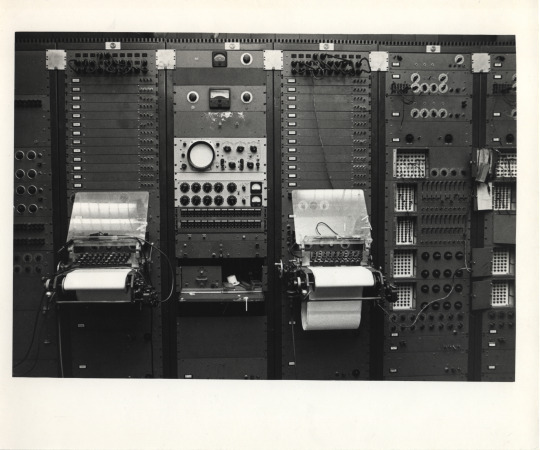

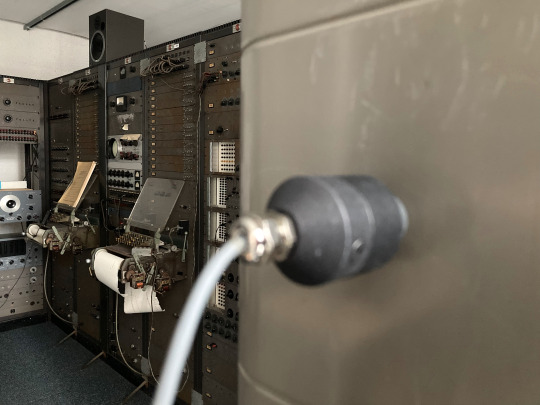

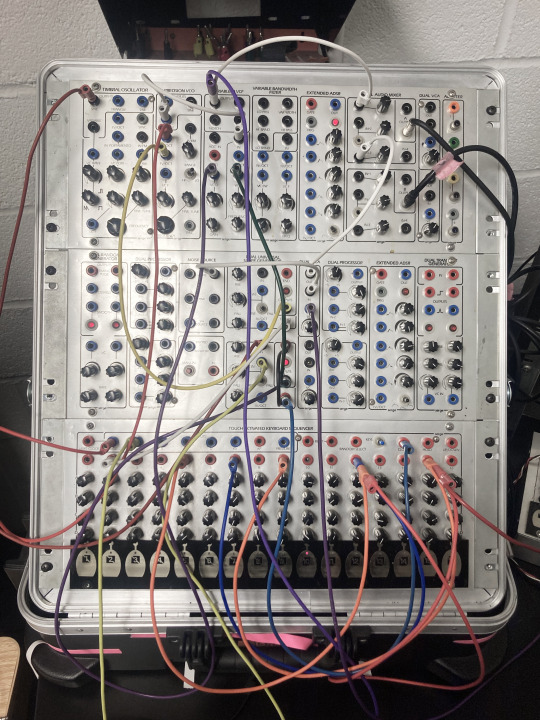
STATE MUSIC — COMPUTER MUSIC CENTER AT COLUMBIA UNIVERSITY
I spent five weeks in NYC between March and April 2023. It was a fantastic opportunity to work at the Computer Music Center in New York. The CMC is the first electronic music studio in the USA and Seth Cluett was kind enough to let me continue my research in the best conditions.
During this stay I was able to compose two new pieces for my forthcoming debut album State Music. The first was recorded in Studio 324 on two very early versions of Buchla and Serge analogue modular systems and two Bode frequency shifters. The process was similar to what I had done at EMS Stockholm, Radio Belgrade, KSYME Athens and Willem Twee Studio in Den Bosch. I tried to adapt to the machines installed in the studio, tested a lot of patches and recorded many hours of textures, accidents and other sonic events using a variety of techniques. The editing, collaging, layering and mixing was done later in my studio. I just followed one rule. Don't use the same recording twice. No loops, nothing like that.
The second composition was recorded in Jace Clayton's office. Why? Because the RCA Mark II, considered one of the first music synthesizers ever, still sits in that room. The synth has been out of order since 1976, when someone broke into the Prentis Hall building and vandalised the machine. But I decided to make use of it anyway. I opened one of the office windows to let sounds from the city into the room and recorded the tiny vibrations caused by street noise with a geophone magnetised to the synthesizer. In this way the synthesiser essentially acted as a loudspeaker. A cheap recorder was placed near the window. Two wide cardioid microphones were placed in the middle of the room for a high quality recording. Most of the time I sit in front of the synthesizer and do nothing but listen, and every now and then I flip a switch, turn a potentiometer or unplug a patch cable to activate the acoustic space of the office and make the metal frame of the machine vibrate.
It was an amazing moment. I've been working on the State Music project since 2018. I realised that being in that room with that silent machine felt like achieving something. My understanding of electronic music history is much deeper. The links between early synthesizers and the military industry are now much clearer to me. State music? Corporate music? I don't know and it doesn't matter.
Here's an anecdote from The Enabling Instrument: Milton Babbitt and the RCA Synthesizer" a paper by Martin Brody.
When the Mark-I appeared in 1955, it was listed in the RCA Acoustics Laboratory inventory with a proud comparison: The synthesiser was 'second only to the Typhoon rocket simulator as the largest single assembly to come out of the David Sarnoff Research Center'. [Although the Mark-I was built to recreate a peaceful expression of human subjectivity rather than to obliterate a hostile and remote man-machine, its input/output components were as indifferent to the workings of the psyche as an anti-aircraft predictor.As Harry Olson recalled, to test their new machine, Olson and Belar followed Seashore's playbook of analysing past performances. The goal was not to expose the musical mind, but to simulate the sounds of acoustic instruments and human performers with the utmost precision.
I would like to thank Seth Cluett, Anna Meadors, Jace Clayton and Nick Patterson for their help.
#large#RCA#STS Serge synthesizer#Buchla 100#RCA Mark II#Victor#Computer music center#Seth Cluett#Martin Brody#Milton Babbit#Vladimir Ussachevsky#Milton Babbitt
5 notes
·
View notes
Text
Milton Babbitt and Lou Harrison being relatable as fuck
I recently had to read two interviews from William Duckworth's Talking Music, in which he interviews a bunch of composers. I just had to share some of the things I wrote while reading.
Firstly, the stuff my therapist will be seeing (as soon as I actually get one, that is):
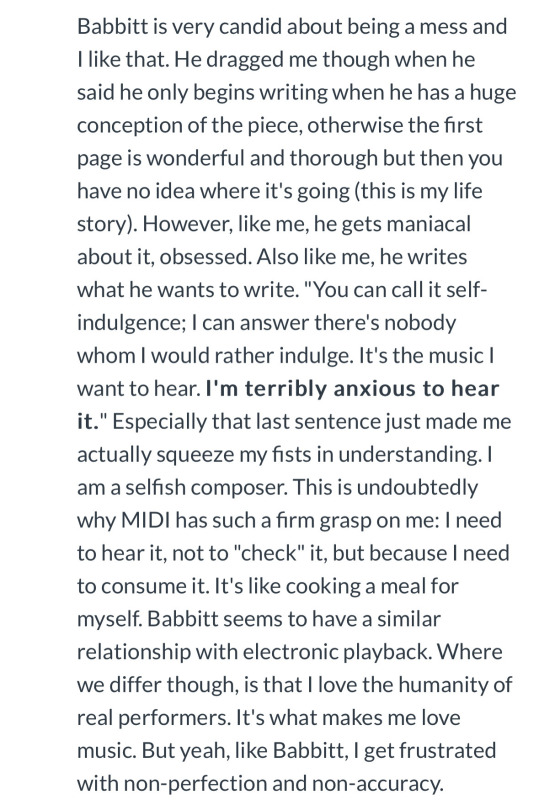

I was really shocked at how specifically relatable these points were to me. Especially Harrison with the "mindlessness". Babbitt struck me as well, but I imagine that writing solely for oneself isn't something exactly rare to find in composers, especially neurodivergent ones. Harrison actually also touches on that kind of feverish-ness of needing to create:

Lastly, some general observations:


Really good read. I highly recommend this book; it's extremely comprehensive. I'll probably put a few more of these in here as the semester progresses.
1 note
·
View note
Text
Some snippets of my discussion post on Milton Babbitt and Lou Harrison’s interviews from “Talking Music” by William Duckworth
I do not intend to make this blog like an educational thing. Most of it is definitely gonna be incoherent rambling and obsessing over stuff, but I really want to share this.
Firstly, the stuff for my imaginary therapist:
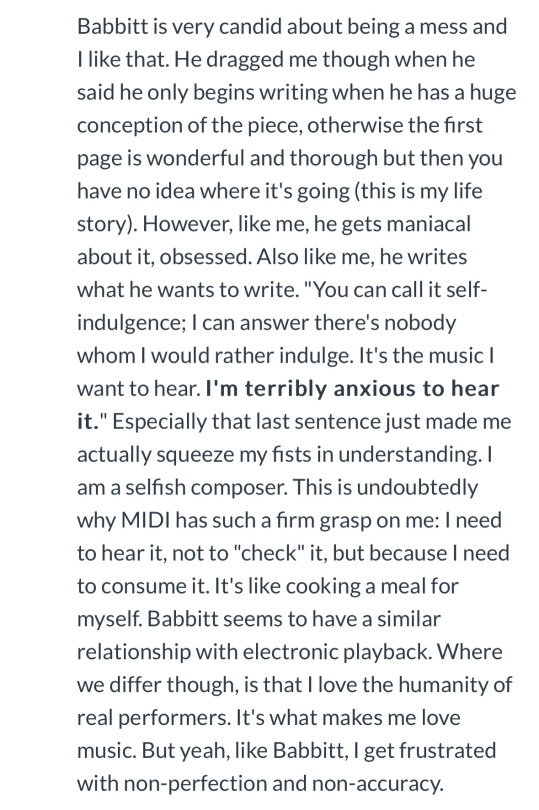

I was really shocked at how specifically relatable these points were to me. Especially Harrison with the “mindlessness”. Babbitt struck me as well, but I imagine that writing solely for oneself isn’t quite as rare to find in composers, especially neurodivergent ones. Harrison actually also touches on the kind of feverishness of needing to create:

Lastly, some general observations:

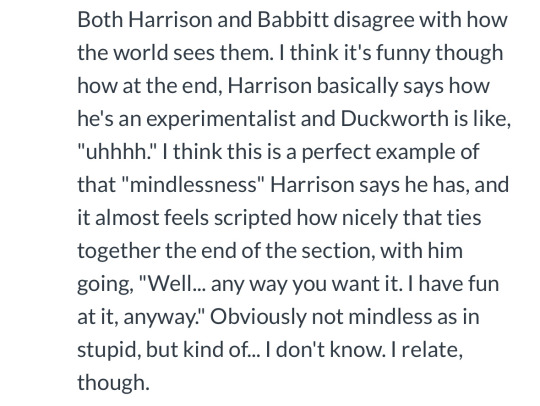
Really good read. Highly recommend this book. I’ll probably put a few more of my discussion posts in here as the semester goes on.
Yeah… definitely don’t expect this composure to last…
0 notes
Text
Next Gen Electroacoustic: Kotoka Suzuki
Starkland S-236 Every Starkland release is an event and this one is no different. This is a composer new to this writer and likely new to most of the new music community. But fear not of the unknown. Advance praise from the likes of John Chowning (one of the reigning bright lights of electronic music) of Stanford certainly add a heady air of anticipation as we are now privileged to hear what is…

View On WordPress
#Classical Music#Composers#contemporary music#Cristina Valdes#Edgar Varese#Jacobs School of Music#Javier Hagen#John Chowning#Jonathan Harvey#Kotoka Suzuki#Mario Davidovsky#Milton Babbitt#Modern Music#Music#New Music#Piano#Spektral Quartet
0 notes
Text
Synthesized Tronata for solo Schumpeter (To Joseph)
1 note
·
View note
Text

The RCA Mark II Synthesizer at the Columbia-Princeton Electronic Music Center at Columbia's Prentis Hall on West 125th Street, NYC in 1958.
Pictured: Milton Babbitt, Peter Mauzey, Vladimir Ussachevsky.
7 notes
·
View notes
Text

1998: The American Academy of Arts and Letters inducts new members Sondheim, Arthur Miller, Milton Babbitt, and Ellen Taaffe Zwilich.
3 notes
·
View notes
Text
Stereotypical “tumblr user” music poll!! Reblog this and tag with a number for how many of these artists you listen to.
Throbbing Gristle
Pauline Oliveros
Егор и Опизденевшие
Qebrµs
Jacob Kirkegaard
Delia Derbyshire
Brian Ferneyhough
Iannis Xenakis
Merzbow
Oval
The Gerogerigegege
Milton Babbitt
Meshuggah
ज़ाकिर हुसैन
Mitski
14 notes
·
View notes
Video
youtube
peter chauncey’s SONG OF THE WEEK: “Share Our News” https://peterchauncey1.bandcamp.com/track/share-our-news ...peter has roots in the San Francisco Bay Area and Arizona, but he originally comes from Jackson, the state capital of Mississippi and a fulcrum city of the Civil Rights Movement in the 1950s-60s. It's The City of Soul, referenced in films, literature, and a Johnny Cash song. Jackson birthed electronic music composer Milton Babbitt, as well as blues and jazz artists such as Otis Spann and Cassandra Wilson. These elements and more inform peter’s singing and songwriting. “Share Our News” speaks to the mass awakenings going on in regard to race, conflict, and resolution. One single song spoken from the heart speaks to many.
https://peterchauncey1.bandcamp.com/track/share-our-news
#media #news #Jackson #Mississippi #Capitol #state #civilrights #soul #films#literature #singersongwriter #JohnnyCash #MiltonBabbitt #OtisSpann#CassandraWilson #race #conflict #resolution #insurrection #peterchauncey #music#civil #share
#media#news#Jackson#Mississippi#civil rights#soul#Johnny Cash#Milton Babbitt#Cassandra Wilson#insurrection#Peter chauncey
0 notes
Text
Whisper-shouted in my ear on the dance floor: "I HAVE THE COLLECTED ESSAYS OF MILTON BABBITT!!"
3 notes
·
View notes